{title}
{publish}
{head}
Looking back on its century-long history, Vietnam has actively participated in and strictly adhered to international commitments on freedom of speech and freedom of the press, as enshrined in the United Nations Charter and relevant regional and international treaties. Despite significant efforts and tangible progress—recognized and highly appreciated by many countries—some individuals and organizations persist in issuing biased, one-sided, and unfounded assessments on this matter.

Celebrating the 100th anniversary of Vietnamese Revolutionary Journalism (Photo: Phu Tho Newspaper)
Many reactionary organizations and online platforms have deliberately distorted the leadership and proper management of the Vietnamese Party and State over the press, exploiting these narratives to call for changes to the political system and the removal of the Party’s leadership role. Reporters Without Borders (RSF), for instance, has repeatedly praised so-called “independent journalists”—many of whom have never undergone formal journalistic training, have never worked in professional media, and primarily post anti-government content on social media.
Let us consider a few examples to understand RSF’s true motives: manipulating the notion of “press freedom” to fabricate stories, spread misinformation, and sabotage Vietnam. These false and distorted narratives not only present a skewed and hostile image of Vietnam to the international community but also risk influencing the evaluations of international organizations and foreign governments concerning Vietnam’s human rights record and level of social development.
These actions—deliberate, fabricated, and ideologically driven—demonstrate how hostile and reactionary forces promote individualistic ideologies without legal, ethical, or social responsibility. They disregard the consequences inflicted upon communities and society. Ironically, such behavior runs counter to the very principles of freedom of speech and press freedom upheld by the countries they often cite—principles rooted in responsibility and aimed at advancing a progressive, humane society.
From the birth of the Thanh Nien newspaper—founded by Nguyen Ai Quoc on June 21, 1925—Vietnamese revolutionary journalism has acted like a dawn piercing the darkness of colonialism, illuminating the nation’s journey from the fight for independence and the birth of the Democratic Republic of Vietnam (1945) to the prolonged resistance against French colonial rule (1954), the anti-American war and reunification of the country (1975), the border defense in six northern provinces, and the ongoing efforts to build and develop a peaceful, modern nation.
Now at 100 years old, Vietnamese revolutionary journalism stands as a living witness to the country’s historic milestones—through wars, reconstruction, and renewal. Today, those working in the press continue to face challenges, especially in adapting to rapid technological changes and evolving reader demands.
Like many countries around the world, Vietnam respects and safeguards the right to freedom of speech and freedom of the press. In fact, the country has made notable achievements in ensuring these rights for its citizens. Upon gaining independence, the 1946 Constitution of the Democratic Republic of Vietnam enshrined in Article 10 the fundamental freedoms of citizens: “Vietnamese citizens have the right to freedom of speech, freedom of publication, freedom of association and assembly, freedom of belief, and freedom of residence and travel within the country and abroad.”
These essential rights have been consistently upheld and reinforced in subsequent constitutions—1959, 1980, 1992, and most recently, the 2013 Constitution. Article 25 of the 2013 Constitution affirms, “Citizens have the right to freedom of speech, freedom of the press, access to information, assembly,” and so on. “The exercise of these rights shall be prescribed by law.”
The 2016 Law on the Press further elaborates citizens’ rights to freedom of the press and freedom of speech in the press. Article 13 affirms, “The State creates favorable conditions for citizens to exercise their right to freedom of the press and freedom of speech in the press, and for the press to properly promote its role.”
At the same time, Clause 2 of Article 13 clearly states: “The press and journalists operate within the framework of the law and are protected by the State. No one is allowed to abuse the freedom of the press or freedom of speech in the press to infringe upon the interests of the State or the legitimate rights and interests of organizations and citizens.”
Over the years, Vietnam’s press has remained the voice of the Party and State and the forum of the people—proactively, promptly, and effectively reporting on the country’s major issues. The content of media coverage reflects the press’s role in guiding public opinion, shaping national consensus, and building social unity.
Nguyen Binh- Tuan Linh
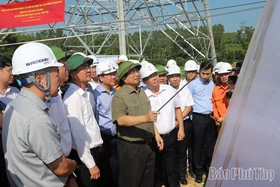
baophutho.vn On the morning of August 9, a working delegation led by Comrade Pham Minh Chinh, Politburo Member and Prime Minister, visited and worked in Phu...

baophutho.vn Phu Tho Province has consistently prioritized the identification, development, and replication of exemplary models in studying and following...
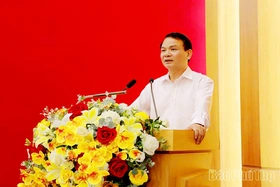
baophutho.vn On the afternoon of August 8, the Provincial Party Executive Committee held its second conference of the 2020–2025 term to implement personnel...
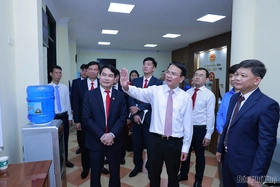
baophutho.vn After one month of implementing the two-tier local government model, thanks to careful, scientific, and well-coordinated preparation—and a...
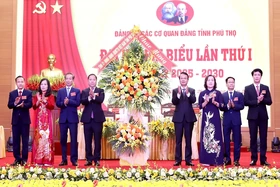
baophutho.vn As of July 31, the last grassroots-level Party organizations in Phu Tho had successfully held their congresses for the 2025–2030 term, making...
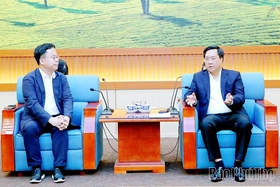
baophutho.vn On the morning of August 1, Mr. Tran Duy Dong – Deputy Secretary of the Provincial Party Committee and Chairman of the Phu Tho People’s...

baophutho.vn On July 30–31, at the Provincial Conference Center, the Party Committee of the Phu Tho Provincial People’s Committee solemnly held its 1st...
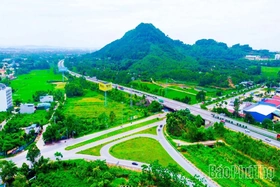
baophutho.vn The merger has given rise to a new Phu Tho Province, not merely through the expansion of administrative boundaries, but more profoundly,...

baophutho.vn On the morning of July 26, in commemoration of the 78th anniversary of War Invalids and Martyrs Day (July 27, 1947–2025), Mr. Tran Duy Dong,...

baophutho.vn On July 26, on the occasion of the 78th anniversary of War Invalids and Martyrs Day (July 27, 1947–2025), Mr. Dang Xuan Phong, Member of the...